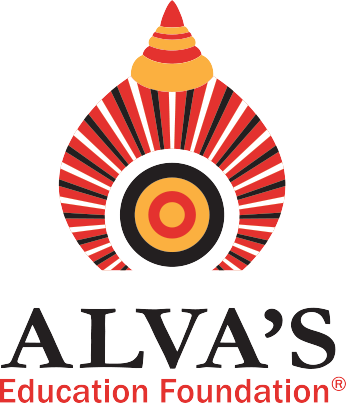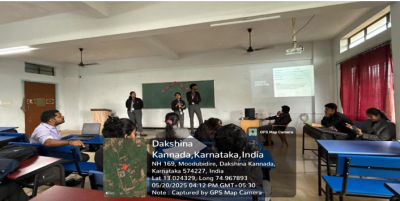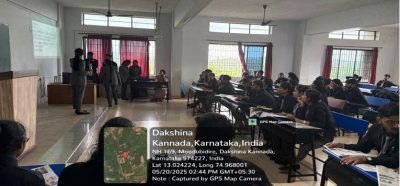Date: 20-05-2025
Venue: 505 Mechanical Block
Department: PG Department of Business Administration
Institution: AIET Mijar
Introduction:
Team Captain Marvel organized a Capacity Development Activity on 20th May 2025 with the primary goal of empowering students with essential leadership, managerial, and industry-relevant skills. The activity was designed to promote hands-on learning, encourage professional growth, and prepare participants to face real-world challenges with confidence. The session integrated interactive tasks and practical exercises aimed at fostering critical thinking, teamwork, and decision-making abilities.
Objectives of the Program:
- To enhance participants’ analytical and decision-making skills in complex business scenarios.
- To foster teamwork and collaboration in achieving shared goals.
- To improve communication skills, boost self-confidence, and enable effective idea expression.
- To help participants understand risk-return patterns, develop financial literacy, and learn smart investment and money management strategies.
There were 6 teams (7 to 8 participants in each team)
Activity 1: Twisted Aptitude Challenge
Time: 2:30 PM – 3:05 PM
Objective: To enhance teamwork, problem-solving, time management, and critical thinking skills among participants.
The Twisted Aptitude Challenge was conducted as a part of the scheduled events to encourage holistic development through experiential learning. The activity was carefully structured into three levels, each designed to test different skill sets of the participants. Each team consisted of three members, with one participant assigned to each level of the challenge.
- Level 1: Participants were required to make 12 paper boats within the stipulated time. This level tested their focus, patience, and time management abilities.
- Level 2: The second level consisted of aptitude-based questions that challenged the participants’ logical reasoning, numerical aptitude, and decision-making skills under pressure.
- Level 3: The final level involved solving a T-puzzle, a classic test of spatial reasoning and critical thinking. Participants had to strategically analyse and fit pieces together to complete the puzzle within a limited time.Activity 2: Group DiscussionTime: 3:10 PM – 3:45 PM
Judge: Mr. Jhonson Fernandes
Objective: To promote effective communication, critical thinking, and confidence in public speaking among students.The Group Discussion activity was held in two insightful and engaging rounds, each focusing on a current and thought-provoking topic. One participant from each team took part in both rounds, representing their teams and contributing actively to the discussions. The sessions were evaluated by Mr. Jhonson Fernandes, who observed the participants’ communication skills, clarity of thought, confidence, and ability to engage in constructive dialogue.Round 1 Topic: “ChatGPT: Pros and Cons”
Participants explored the advantages and disadvantages of AI tools like ChatGPT. The discussion covered various aspects including the tool’s utility in education and productivity, concerns over dependency, ethical use, and potential misuse. Students demonstrated good awareness of emerging technologies and articulated their viewpoints with clarity and reasoning.
Round 2 Topic: “Are Students Becoming Marks-Oriented Instead of Skill-Oriented?”
Participants began by acknowledging the increasing academic pressure on students to secure high grades, often at the expense of developing practical skills and holistic competencies. Several participants highlighted how societal expectations, institutional ranking systems, and parental aspirations contribute to a system that places disproportionate value on marks. This, they argued, leads to rote learning, reduced creativity, and a lack of preparedness for real-world challenges.
On the other hand, some students emphasized the importance of marks as a standardized measure to evaluate academic understanding and gain access to higher education and job opportunities. However, even these participants agreed that there should be a balanced approach, where marks and skill development go hand in hand.
The conversation also touched upon the role of educational institutions in shaping student priorities. Participants proposed that curricula be redesigned to include more project-based learning, internships, and practical applications of theoretical knowledge. Some participants suggested the incorporation of life skills, communication, problem-solving, and entrepreneurship into the formal learning process to prepare students for dynamic career environments.
There was a strong consensus on the need for a mindset shift—from merely performing well in examinations to acquiring competencies that ensure long-term personal and professional growth. The group also discussed how new education policies and reforms could potentially address this issue by emphasizing experiential learning and continuous assessment models.
Judge Mr. Jhonson Fernandes appreciated the depth and maturity of the discussion. He commended the participants for their critical thinking, effective communication, and the ability to listen and respond to counter arguments respectfully. His feedback underscored the importance of such platforms in developing students’ perspectives and preparing them for meaningful conversations in academic and professional settings
The activity successfully achieved its goal of enhancing students’ ability to express opinions, listen actively, and engage in meaningful discussion.
Time: 3:50 PM – 4:40 PM
Judge: Mr. Ashok
Objective: To develop students’ understanding of risk-return trade-offs, financial planning, and money management through hands-on experience.
The Investment Portfolio Diversification activity was designed to provide students with practical exposure to financial decision-making and investment strategies. Each team was given a virtual budget of ₹10 lakh and tasked with allocating the funds across a range of investment options such as equities, mutual funds, fixed deposits, real estate, gold, and other financial instruments. Teams were also required to create and present a PowerPoint presentation justifying their investment choices. Participants approached the activity with great enthusiasm, applying theoretical knowledge to real-world scenarios. They conducted research, analysed market conditions, and assessed the risk-return profiles of different asset classes. The presentations showcased well-structured portfolios with diverse allocations, tailored to meet specific investment goals such as capital growth, income generation, or risk mitigation
Mr. Ashok, who served as the judge, evaluated each team based on the logic of their allocation strategies, understanding of market dynamics, clarity in presentation, and ability to justify their decisions. He also provided valuable feedback and insights into effective portfolio management and long-term wealth creation.
The activity successfully met its objective of strengthening financial literacy among students. It encouraged critical thinking, strategic planning, and practical application of investment principles. Moreover, it enhanced participants’ ability to work as a team and present financial concepts with confidence and clarity.
Outcomes:
- Strengthened teamwork and coordination under pressure.
- Improved time management and task division abilities.
- Improved public speaking and communication skills.
- Encouraged critical thinking and active listening.
- Understood the concept of risk and return in various investment options.
- Improved analytical thinking and decision-making ability.
Total of 52 Students were benefited from this activity



